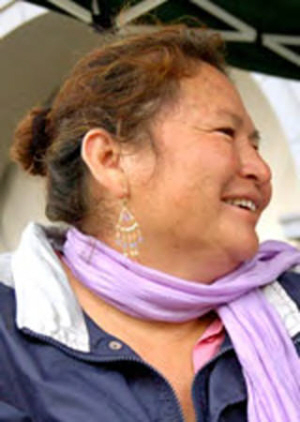María Inés Catalán
María Inés Catalán was born in Santa Teresa, Guerrero, Mexico, in 1962. She immigrated to the United States in 1986 and picked broccoli and carrots in the Salinas Valley of California. Her father was also a migrant farm worker, but her grandfather had owned land that the family farmed in Mexico. Catalán’s life took a different turn when in 1994 she entered an organic farming training program at the Rural Development Center in Salinas. (This was an earlier incarnation of what is now known as ALBA, the Agriculture & Land-Based Training Association program). This incubator program helps farm workers become organic farmers by providing training in farming and marketing, and leasing them land.
After graduating, Catalán became the first Latina migrant farm worker to own and operate a certified organic farm in California, and the first Latina in the country to found a farm that distributes produce through a community supported agriculture program. María Inés and her family have run Catalán Family Farms on fifteen acres of rented land in Hollister, California, since 2001. Their farm was certified organic by CCOF in 2005. The Cataláns grow kale, chard, strawberries, tomatoes, corn, onions, pumpkins, chiles and carrots, among other crops that they sell through Laughing Onion CSA and at farmers’ markets around the Salinas, Monterey Bay, and San Francisco Bay areas, including the Ferry Plaza Market in San Francisco, and the Berkeley Farmers’ Market.
In addition to her farming, Catalán is also an activist who devotes herself to improving food security for low-income communities, especially Latinos. She worked with the group P.O.D.E.R. (People Organizing to Demand Environmental and Economic Rights), in San Francisco’s largely Latino Mission district, to deliver CSA shares to their members. Over the years her CSA project has also collaborated with schools and churches, and with the Homeless Garden Project’s CSA in Santa Cruz; it has delivered boxes to people who are home-bound, and provided information about her CSA in Spanish. Catalán set up a farm stand outside the government office in Monterey County, on the day when women pick up their WIC (Women, Infant and Children) allowances.
She founded her own non-profit, Pequeños Agricultores en California (PAC), to help immigrant farmers acquire organic certification, helping them apply for grants and loans and work towards owning their own land. Catalán Farms also invites local high school and college students to visit and learn about organic farming. A group of eighth graders camps out each year for a week at a time and works the land. In 2008 Catalán was honored by the Center for Latino Farmers for “her tireless work in advocating for organic farming and assisting limited resource producers using her own funds.” This oral history was conducted on July 27, 2009, in Spanish, by Rebecca Thistlethwaite. Thistlethwaite and Catalán know each other from Thistlethwaite’s work as program director for the Agriculture & Land-Based Training Association.
Date of Interview
Interviewer
2009-07-27
Rebecca Thistlethwaite
Project
Program/Repository
All uses of these manuscripts are covered by copyright agreement between the interviewees and the Regents of the University of California. Under “fair use” standards, excerpts of up to six hundred words (per interview) may be quoted without the Regional Oral History Project’s permission as long as the materials are properly cited. A sample citation would read: “Excerpted from Rebecca Thistlethwaite: TLC Ranch and the Agriculture & Land-Based Training Association, a transcribed interview conducted by Sarah Rabkin and included in Cultivating a Movement: An Oral History Series on Organic Farming and Sustainable Agriculture, published by the University of California, Santa Cruz Library’s Regional Oral History Project, 2010: http://library.ucsc.edu/reg-hist/cultiv/home).” Quotations of more than six hundred words require the written permission of the University Librarian and a proper citation and may also require a fee. Under certain circumstances, not-for-profit users may be granted a waiver of the fee.

[I]f you have a dream, to not let your reality kill your dream. Believe in yourself, and find a way to make your dream come true. Grab hold of that dream.